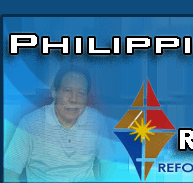Aphasia Foundation of the Philippines, Inc.
A non-stock, non-profit organization for People w/
Aphasia and their families and Caregivers
You are not alone!
There
are many more like you or your loved one – men and
women who once were articulate and active, but are today
unable to connect words with their thoughts, unable to speak
their mind, unable to recognize letters and numbers.
TV Host
Jeanne Young’s sister Peachy started showing Parkinsonian
symptoms in 1984, which caused her seizures and confined
her to a wheelchair. The disease has reduced her speaking
ability to only 20%; she communicates with her eyes 80%
of the time.
Manolo
“Bong” Marfa, a medical doctor by profession
who graduated cum laude at the University of the Philippines,
was hit by a truck while driving home in 1993. The accidents
damaged the part of his brain that controls speech, hearing
and reading. He now has great difficulty reading and writing.
Former
UP Pres. Noel Soriano had a massive cerebral stroke in 1996,
rendering him speechless and paralyzing his right extremities.
Although his comprehension is intact, oral and written abilities
have been very limited since then.
Manuel
D. Asensio, a retired executive from Nestle Philippines,
Inc. and husband of renowned soprano Fides Cuyugan-Asensio,
was swaying slowly to party music in a family gathering
when he suddenly collapsed. He had a heart attack. His brain
was deprived of oxygen during the three-hour ambulance drive
to the hospital, causing him to lose both sight and his
speech faculties.
What
is APHASIA?
Alphasia
(uh-fay'zha) is the acquired communication impairment that
affects the person's ability to speak, understand, read
or write. It is usually caused by stroke but can also be
brought about by other forms of brain injury like head trauma,
brain tumors, and infections.
Alphasia
comes in different forms. Some people may be able to speak
with much effort in finding the right words, or some may
speak effortlessly but use the wrong words. Some may find
it difficult to understand spoken words. Typically they
may have problems reading and writing, too. Alphasia creates
a profound change in the lives of aphasic individuals and
their families as they face a lifetime of adjustments and
challenges.
There’s
Hope in Alphasia Foundation
Socializing
is important for people w/ aphasia, because it helps relieve
their depression and convinces them that they are not alone.
So said Dr. Robert Gan, a neurologist and consultant at St.
Luke’s and Cardinal Santos Medical Centers, in an article
published in Manila Bulletin dated September 22, 1999.
Realizing
that mutual support can help people with aphasia to cope with
their condition, we have formed the Aphasia Foundation of
the Philippines, Inc. (AFPI). We are a group of aphasics and
caregivers aiming to provide assistance and support to one
another in order to live more meaningful and purposeful lives.
Our
Objectives
1. To promote community understanding and
advocacy for people w/ aphasia, families, and professionals
who work with them.
2. To provide information resources on research
issues and treatment of aphasia.
3. To develop throughout the country individual
chapters that will create opportunities for socialization,
language stimulation, peer support, and community contact
for people with aphasia.
What
Our Members Say
“After the stroke, I was completely
at a loss but I fought back the depression. The support I
get from Aphasia Foundation, plus therapy, has contributed
much to my improvement.” – Jun Celis, former PBA
Player for Crispa
“I wanted to kill myself after I had
a stroke. I felt profoundly lonely and no one cared to understand
me. Now that I have bounded with fellow aphasics in Aphasia
Foundation, I feel so much better.” – Danny Angeles
“Aside from socialization, our many
activities in Aphasia server to stimulate our speech abilities.
We also invite professional health care providers to talk
on topics import to us. This helps to educate and enlighten
us about our condition.” – Danny Velasquez, retired
executive from Nestle Philippines
“Through
AFPI, caregivers are able to bond with one another by exchanging
experiences. We share the same feelings of exhaustion and
anxiety, so we are able to give support to one another.”
– Angelica Soriano, wife and primary caregiver of Noel
Soriano
Board
of Directors
Nathalie
Maggay
Chita Moscoso
Pedro M. Lopez
Theresa Lukban
Dr. Raul de Guzman
Danilo Angeles
Dr. Emanuel Soriano
Danilo Velasquez
Ma. Lourdes Macatangay
Maria De Los Angeles S. Albert
Atty. Domingo Celis
| 








